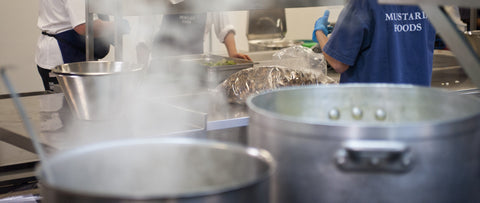In a recent poll, Mustard Foods found that 33% of respondents across the hospitality industry cited ‘issues with quality and consistency’ as one of their biggest operational challenges.
Restaurants may turn to a central kitchen for support when managing smaller prep kitchens, staffing shortages, or rolling out an expansion project.
In a recent poll, we found that 33% of responders cited ‘issues with quality and consistency’ as their main concern, while 27% listed ‘shortage of chefs’ as their biggest challenge.
Survey responders spanned across the hospitality sector including restaurants, delicatessens, garden centres, and caterers.
Of course these two issues are connected. With a shortage of skilled chefs, restaurants may rely on more agency staff to support the kitchen. Temporary workers may have experience and skill, but they lack training on the brand’s specific standards and signature recipes, which can lead to inconsistency in execution.
How do industry leaders respond to quality and consistency issues?
To manage an evolving hospitality landscape, leading restaurant groups are implementing smarter systems and infrastructure to scale a business without compromising quality and consistency.
-
Streamlined menus and prep
The UK has seen a significant shift toward restaurants with a smaller, core-focused menu. For example, certain pizza parlours, steakhouses and noodle bars sell just one high quality menu item with a choice of toppings, sides and sauces. Reducing the menu offering keeps quality standards high and lowers the margin for error, especially when teams are stretched. -
Central Production Units (CPUs)
Some of London’s most successful restaurants have a CPU to prepare core components off-site. It ensures a standardised high quality product across locations, a reduced workload at individual sites, and consistent execution between permanent and temporary staff. -
Standardising SOPs across locations
All recipes, including CPU menu items, require standardised documentation to close the gap between permanent and temporary staff. Hospitality businesses have to invest in systems that enable them to scale and interchange easily, for example, comprehensive SOPs. Investing in training and operational infrastructure ensures quality control, consistent execution, and reduces onboarding time.







Comments (0)
There are no comments for this article. Be the first one to leave a message!